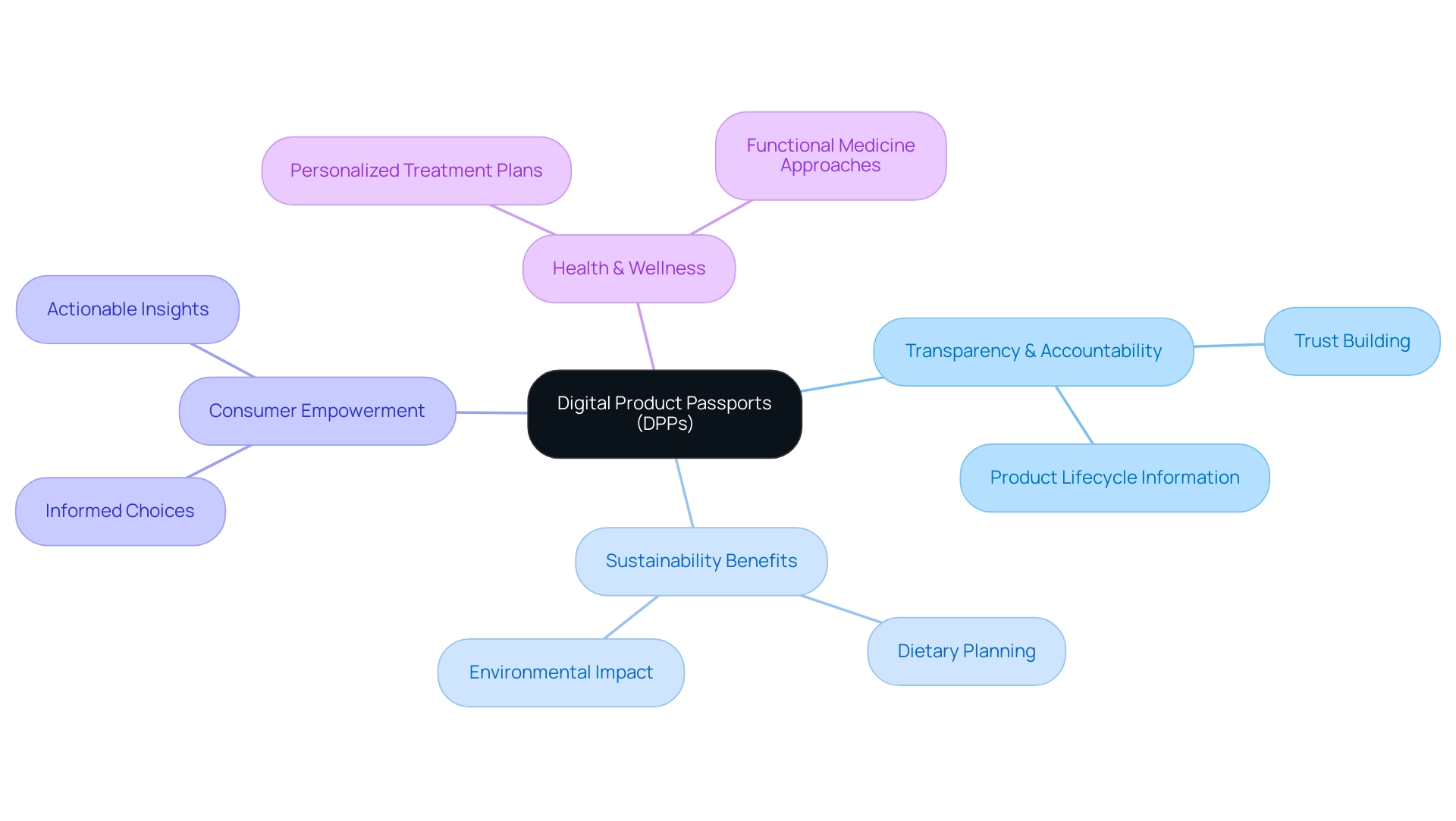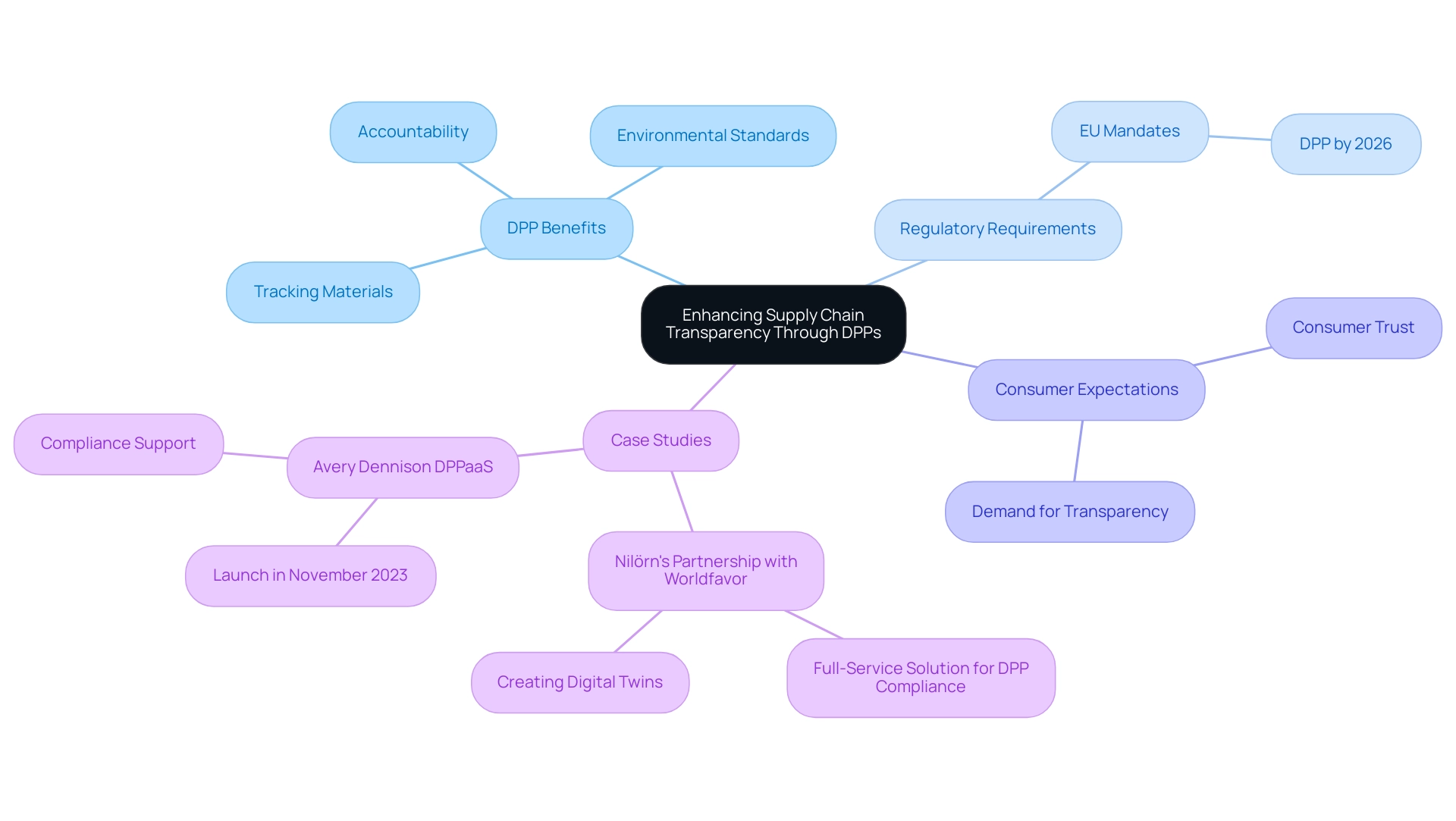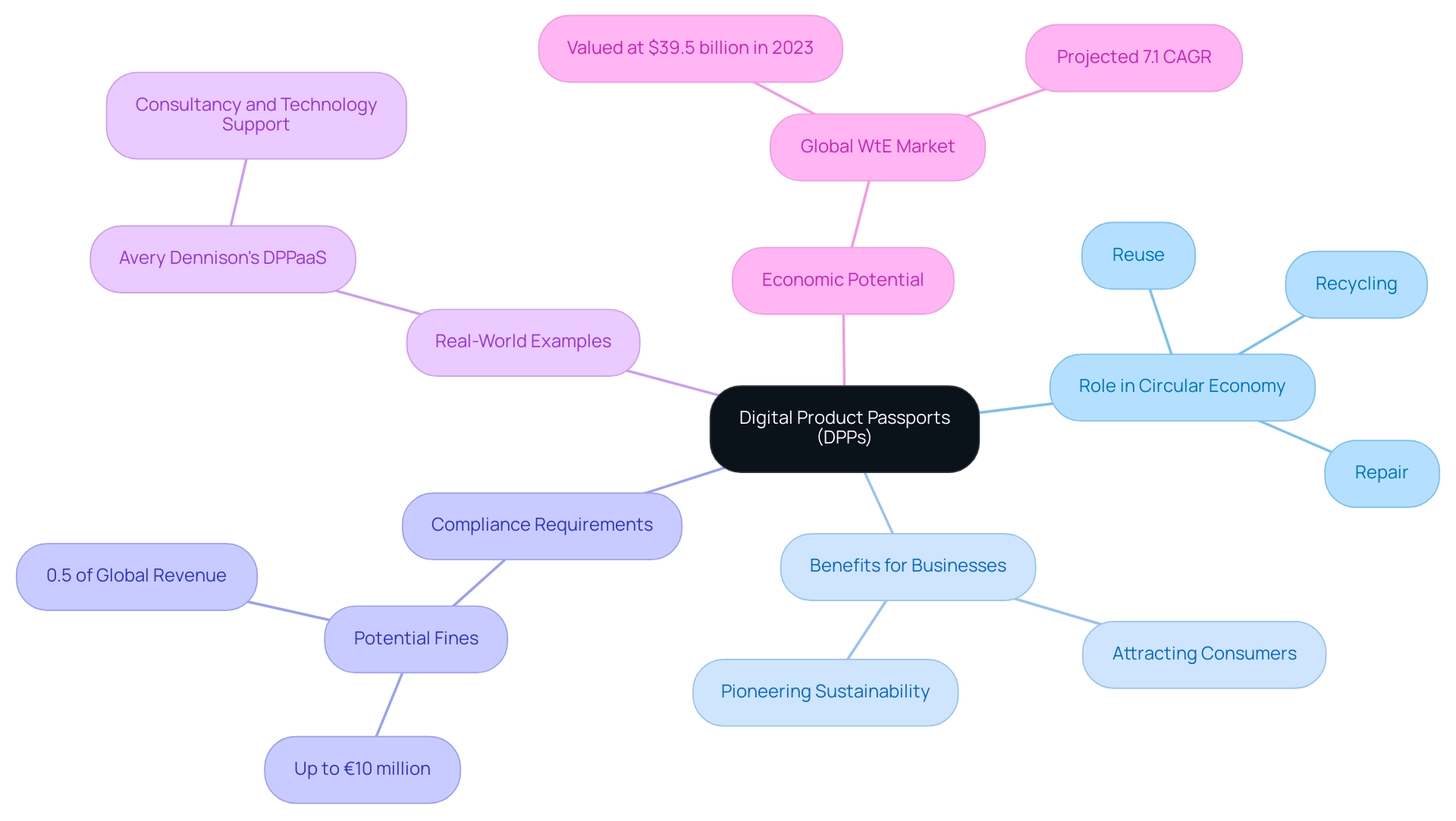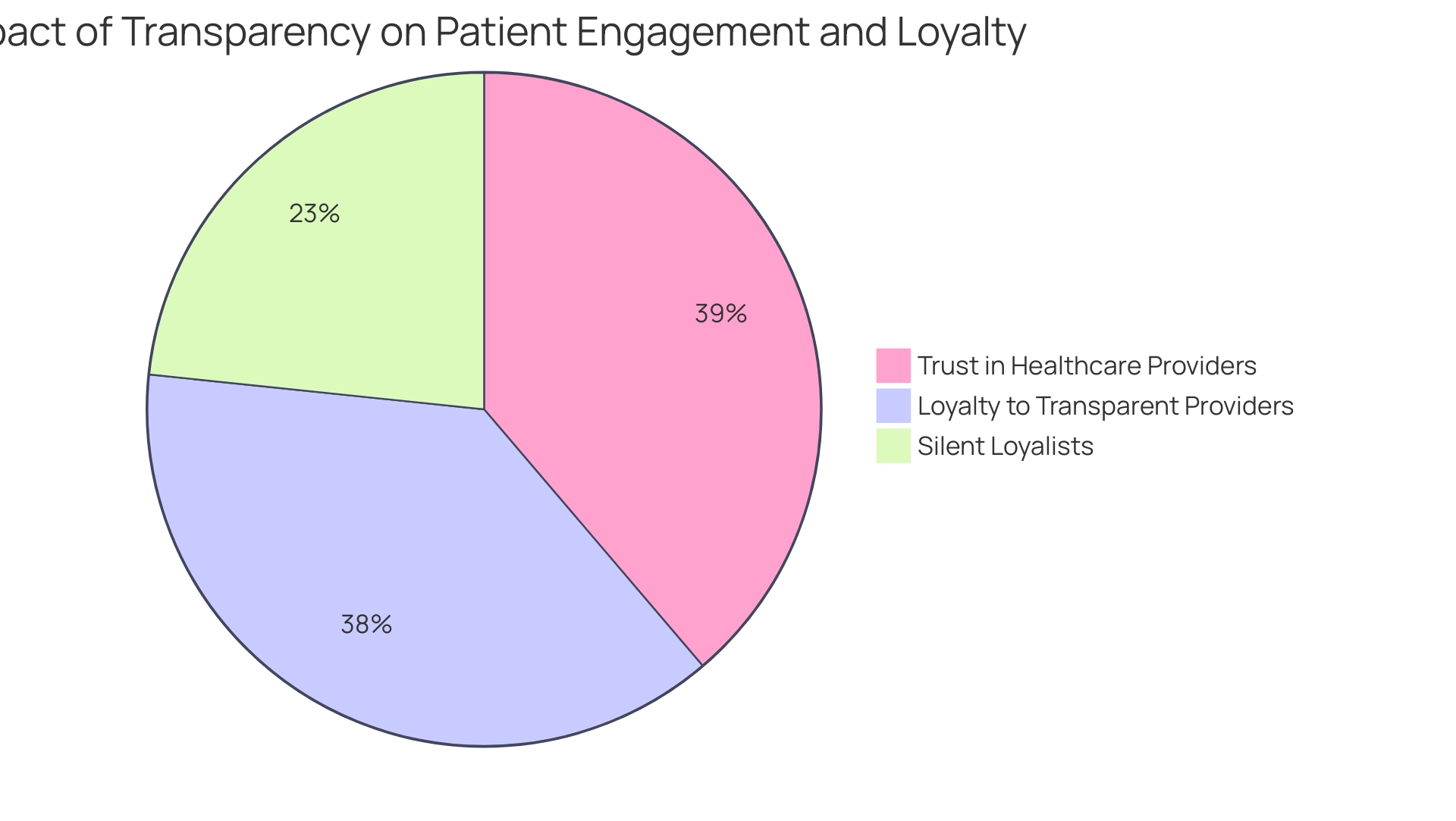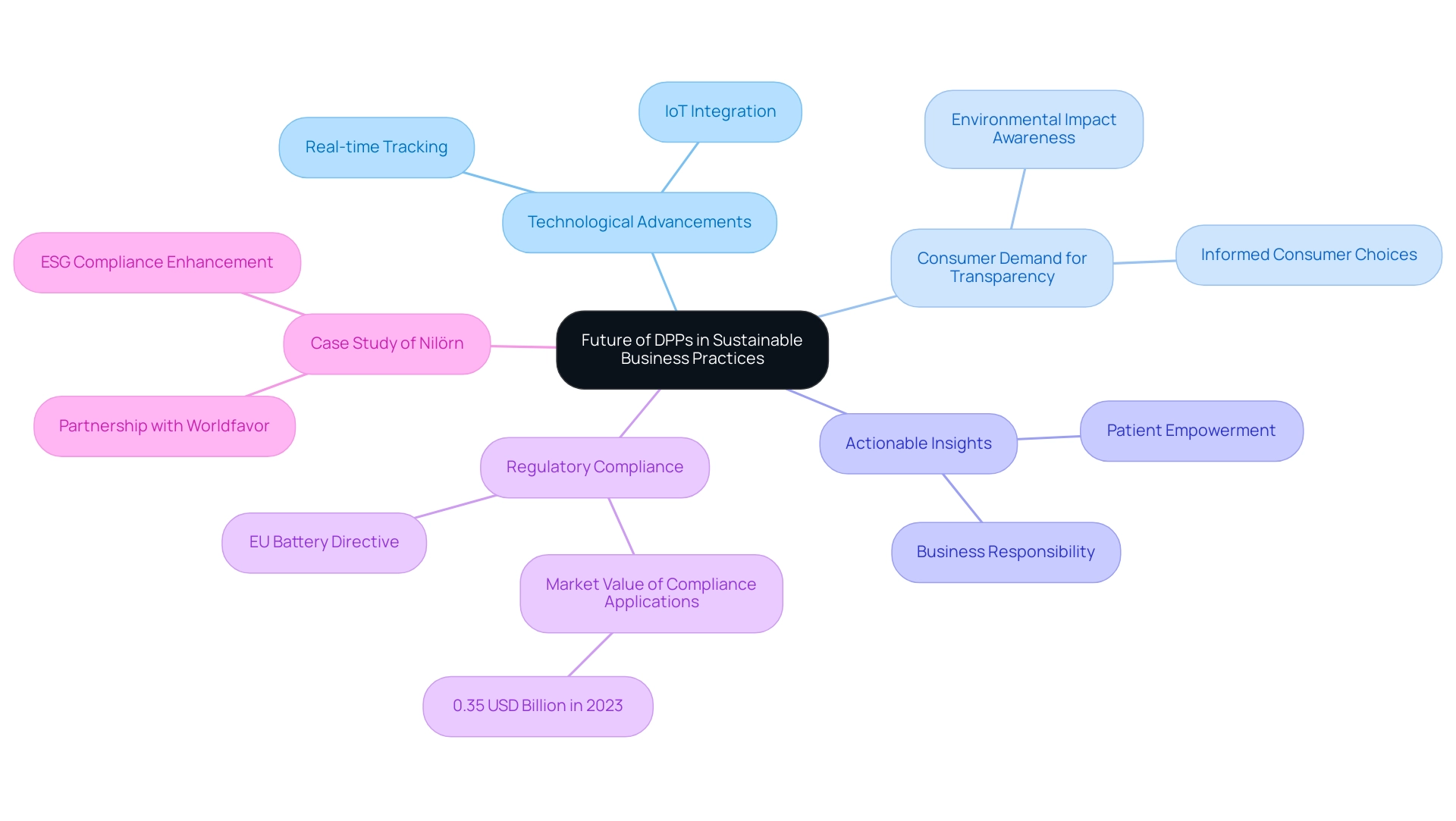Overview
The article explores the compassionate benefits of Digital Product Passports (DPPs) for fostering sustainable business practices. It highlights how these passports enhance transparency, accountability, and consumer trust, which are vital in today’s world. It’s important to recognize that DPPs empower businesses to meet regulatory requirements while promoting sustainability. By providing detailed insights into product lifecycles, DPPs help businesses engage more meaningfully with eco-conscious consumers. This connection can significantly improve overall health outcomes, especially for individuals managing chronic conditions like type 2 diabetes. Many patients find that understanding the products they use leads to more informed choices, ultimately supporting their health journey.
Introduction
In a world that increasingly values sustainability and transparency, Digital Product Passports (DPPs) stand out as a crucial innovation. They are reshaping how businesses manage their products, from the moment they are created to when they are disposed of. These digital records offer detailed insights into a product’s lifecycle, fostering a sense of accountability and trust with consumers, especially in the health and wellness sector.
It’s important to recognize that as organizations strive to meet the growing demand for ethical practices, DPPs provide a transformative solution. They enhance transparency, support circular economy goals, and improve patient engagement. Many patients find that understanding the journey of a product can empower them to make informed choices.
The integration of DPPs goes beyond mere compliance; it represents a meaningful shift towards a more sustainable future. This shift allows us to embrace healthier lives and a more responsible marketplace. Together, we can navigate this journey, ensuring that our choices reflect our values and contribute to a better world.
Understanding Digital Product Passports (DPPs) and Their Role in Sustainability
Digital Product Passports, or dpps, are innovative digital records that capture essential information about a product’s lifecycle, including its origin, materials, and environmental impact. These dpps are crucial for businesses aiming to enhance transparency and accountability in their operations, especially within the health and wellness sector. It’s important to recognize that by embracing dietary planning practices, companies can not only meet regulatory requirements but also foster a culture of sustainability that resonates with eco-conscious consumers, including those managing type 2 diabetes.
Many patients find that the integration of these tools empowers businesses to innovate and adapt in a rapidly changing market. These tools enable enhanced product lifecycle transparency, allowing consumers, particularly healthcare recipients, to make informed choices based on a product’s sustainability credentials. Furthermore, dpps can enhance business transparency, fostering trust and loyalty among consumers who prioritize ethical practices.
In the realm of wellness products, clarity is essential for individuals managing chronic conditions such as type 2 diabetes. As Dr. Jason Shumard emphasizes, “By offering individuals actionable insights and practical tools, the center cultivates an atmosphere where people can reclaim their well-being, ultimately resulting in enhanced quality of life and diminished dependence on traditional medical interventions.” This dedication to education and empowerment is vital, especially given the concerning statistics of 7,000 incorrect medications administered and 80,000 infections acquired in hospitals annually.
These safety concerns highlight the need for greater accountability in product management. Dr. Shumard’s approach at the Integrative Wellness Center focuses on comprehensive wellness solutions, enabling individuals to reverse type 2 conditions and hypothyroidism through functional medicine. This includes personalized treatment plans, nutritional guidance, and lifestyle modifications tailored to each individual’s unique needs. By incorporating dpps into wellness product management, the center enhances its ability to offer personalized advice and resources, further supporting individuals in their journey toward effective management of their condition.
In summary, dpps represent a transformative approach to product management, offering numerous benefits for sustainability and health. They not only improve transparency but also empower businesses to engage with consumers meaningfully, ultimately contributing to a more sustainable future for patients managing type 2 diabetes.
Enhancing Supply Chain Transparency Through DPPs
In today’s world, DPPs significantly enhance supply chain transparency by offering comprehensive insights into how materials are sourced and processed. This transparency allows businesses to carefully track every stage of a product’s lifecycle, ensuring they adhere to environmental standards and ethical practices. As consumers increasingly seek accountability from brands, making this information easily accessible fosters a sense of trust and loyalty.
It’s important to recognize that the EU has mandated data protection policies for every product sold by 2026, highlighting the growing significance of transparency in the marketplace. Moreover, enhanced transparency through data protection protocols not only reduces risks associated with supply chain disruptions but also strengthens relationships with stakeholders. Many companies are responding to the rising consumer demand for transparency, with a noticeable increase in the implementation of data protection policies to meet these expectations by 2025.
For instance, recent collaborations between technology firms and corporations have accelerated the integration of digital processing platforms, demonstrating their vital role in promoting sustainable business practices. Industry leaders acknowledge that DPPs not only improve supply chain transparency but also enhance accountability. As Ryan Kuhlenbeck, CEO, wisely stated, “Digital factory technologies like digital production platforms are more than compliance tools; they’re investments in growth, efficiency, and sustainability.” By providing detailed product information, companies can show their commitment to responsible sourcing and production, ultimately leading to improved consumer confidence and satisfaction.
A real-world example is Nilörn’s strategic partnership with Worldfavor, which aims to provide a full-service solution for brands preparing for DPP compliance, ensuring transparency and enhancing ESG compliance.
As we navigate this evolving landscape, executing these programs is becoming a crucial strategy for businesses that aspire to thrive in a market prioritizing sustainability and ethical practices. This focus on transparency and accountability can also extend to diabetes education and patient resources, empowering individuals with the knowledge they need to make informed decisions about their health and the products they use.
Promoting Circular Economy Goals with DPPs
Digital product passports (DPPs) play a crucial role in promoting the goals of a circular economy by enhancing the reuse, repair, and recycling of products. It’s important to recognize that by providing comprehensive insights into a product’s materials and lifecycle, these programs empower businesses to create designs that facilitate recycling and repurposing. This proactive approach not only minimizes waste but also conserves valuable resources, embodying the core tenets of a circular economy.
Many companies that effectively utilize digital product platforms can distinguish themselves as pioneers in sustainability, attracting a growing base of environmentally conscious consumers. This shift is not just beneficial for businesses; it also reflects a broader commitment to the health of our planet.
Moreover, the incorporation of DPPs into business practices supports a transition toward more sustainable product design, which is increasingly important as many current recycling rates remain suboptimal. As we look ahead to 2025, the emphasis on dynamic purchasing practices is expected to drive improvements in recycling efficiency and resource conservation, aligning with global sustainability goals. As organizations adopt these innovative tools, they contribute to a more resilient and responsible economic model, fostering a culture of sustainability that resonates with today’s consumers.
The importance of compliance in sustainability practices cannot be overstated, especially given the potential fines for intentional violations of the DPPs, which can reach up to €10 million or 0.5% of a company’s global annual revenue. A real-world example of the implementation of DPPs is Avery Dennison’s Digital Product Passport as a Service, which supports brands in complying with EU legislation while enhancing their sustainability efforts. Dr. Jason Shumard emphasizes, “By providing patients with actionable insights and practical tools, the center fosters an environment where individuals can reclaim their wellness and well-being.”
This connection underscores the importance of DPPs in empowering individuals, particularly those managing chronic conditions such as blood sugar issues. Moreover, the global Waste-to-Energy (WtE) market, valued at $39.5 billion in 2023 and expected to expand, demonstrates the economic potential of embracing sustainable practices, which can ultimately enhance well-being.
Improving Compliance and Safety Standards with DPPs
Understanding the challenges of managing health can feel overwhelming. Adopting a thorough strategy for condition education and resources can significantly enhance your ability to oversee your well-being efficiently. At Integrative Wellness Center, Dr. Jason Shumard’s Functional Medicine Approach focuses on reversing type 2 conditions through personalized care and education. This empowers individuals with the knowledge and resources essential for achieving better health outcomes. In 2025, individuals participating in Dr. Shumard’s 30-Day Diabetes Reset program have reported transformative advancements in their well-being, showcasing the tangible benefits of this innovative method.
It’s important to recognize that comprehending the underlying factors of diabetes is crucial. This program ensures that individuals not only manage their symptoms but also work towards reversing their condition. Many patients find that this proactive approach not only protects them from potential health issues but also fosters a sense of empowerment and trust in their treatment journey. As Dr. Shumard emphasizes, integrating education into care enhances overall wellness standards, leading to a more responsible and knowledgeable approach to managing diabetes.
With the growing emphasis on healthcare education, there is greater awareness of the importance of lifestyle changes in managing diabetes. In 2025, individuals face increased challenges in overseeing their health, making the adoption of comprehensive educational resources essential. By utilizing Dr. Shumard’s insights and resources, individuals can effectively navigate these challenges, ensuring they achieve their wellness goals while building confidence in their ability to manage their condition.
Reviews from participants highlight the effectiveness of Dr. Shumard’s approach in promoting wellness advancements. For instance, individuals who have engaged in the program report a significant improvement in their understanding of disease management, leading to smoother daily routines and enhanced wellness practices. One participant shared, “Thanks to Dr. Shumard’s program, I not only learned about my condition but also how to take control of it. My blood sugar levels have stabilized, and I feel empowered to make healthier choices every day.” This holistic approach to diabetes care at Integrative Wellness Center not only supports patients but also strengthens their commitment to long-term health and well-being.
Economic Advantages of Implementing DPPs in Business
The adoption of digital product passports (dpps) offers substantial economic advantages for businesses, especially as the healthcare landscape evolves. It’s important to recognize that companies like Avery Dennison are stepping up; they recently launched their Digital Product Passport as a Service (PaaS) to help brands comply with upcoming EU legislation. This initiative not only showcases how businesses can utilize dpps for compliance but also highlights the potential for increased efficiency.
Many companies are discovering specific areas for cost savings, such as optimizing supply chain logistics and minimizing waste. Furthermore, the software segment in the digital product passport industry is anticipated to surpass USD 900 million by 2034. This underscores the growing economic advantages of implementing these systems. Businesses that embrace dpps position themselves competitively in the market, offering products that are sustainable and resonate with an increasingly eco-conscious consumer base.
This strategic alignment fosters operational excellence and drives profitability through improved resource management and customer engagement. As Dr. Jason Shumard insightfully states, ‘By offering individuals actionable insights and practical tools, the center cultivates an atmosphere where people can regain their wellness and well-being, ultimately resulting in enhanced quality of life and decreased dependence on traditional medical interventions.’ This commitment to empowerment and education is crucial for individuals navigating their health journeys. It’s a reminder that we are all in this together, striving for better health and well-being.
Boosting Customer Engagement and Trust with DPPs
Dpps play a pivotal role in enhancing consumer engagement by offering transparent information about healthcare services and products. It’s important to recognize that in 2025, statistics reveal that 88% of individuals who trust a healthcare provider are likely to return for further services. This underscores the importance of transparency in building loyalty. When individuals have access to detailed insights regarding a provider’s practices, particularly in managing conditions like type 2 diabetes, they are more inclined to trust the provider and make informed decisions about their health.
This level of transparency not only fosters loyalty but also resonates with today’s health-conscious individuals who prioritize ethical practices in their healthcare choices. Many patients find that knowing their healthcare provider is committed to transparency helps them feel more secure in their decisions.
Furthermore, these programs enhance a more interactive experience for individuals by aligning with the increasing demand for accountability and ethical standards in healthcare. With 53% of individuals classified as silent loyalists—remaining loyal to providers without actively engaging—there is a pressing need for healthcare providers to develop strategies that actively engage these individuals. By leveraging dpps, the Integrative Wellness Center can cultivate a deeper connection with individuals, ensuring that their commitment to ethical practices and effective diabetes management is communicated effectively.
The influence of ethical practices on loyalty is significant. Studies indicate that 86% of individuals are more likely to remain loyal to healthcare providers that invest in transparent onboarding content. This emphasizes the necessity for Integrative Wellness Center to not only provide information but also to educate individuals about their conditions and treatment options. As Dr. Jason Shumard mentions, “By offering individuals actionable insights and practical tools, the center nurtures an atmosphere where people can regain their wellness and well-being.”
In doing so, these practices enhance patient engagement and trust, ultimately leading to a more sustainable healthcare model that benefits both patients and providers alike.
Contact us today to learn more about how we can support your journey towards reversing type 2 diabetes and achieving your health goals.
Integrative Wellness Center
7094 Miramar Road, Suite 109
San Diego, CA 92121
(858) 564-7081
The Future of DPPs: Driving Innovation in Sustainable Business Practices
The future of digital payment platforms (dpps) is poised for remarkable advancements, especially in sustainable business practices. As technology progresses, we can look forward to enhanced capabilities in these platforms, such as real-time tracking and seamless integration with Internet of Things (IoT) devices. These innovations aim to improve the functionality of dpps while significantly enhancing their role in promoting transparency and accountability within supply chains.
It’s important to recognize that Dr. Jason Shumard, who specializes in reversing type 2 diabetes and addressing hypothyroidism through functional medicine, emphasizes the need for actionable insights and practical tools. He shares, “By providing patients with actionable insights and practical tools, the center fosters an environment where individuals can reclaim their health and well-being.” This perspective aligns beautifully with the proactive adoption of data protection practices, empowering businesses to emerge as leaders in sustainability, establishing benchmarks for industry practices, and fostering a culture of responsibility.
Many patients find that incorporating such practices into business operations resonates with the growing demand for transparency among consumers. These consumers are increasingly informed and concerned about the environmental impact of their purchases. For instance, the case study of Nilörn’s partnership with Worldfavor illustrates how companies can enhance their compliance and sustainability efforts in preparation for dpps requirements. As the landscape of sustainable business continues to evolve, those who leverage dpps technology will not only meet regulatory requirements but also gain a competitive edge by showcasing their dedication to sustainable practices.
The market for Regulatory Compliance applications, valued at 0.35 USD Billion in 2023, underscores the growing importance of compliance and innovation in business practices. The trajectory of dpps indicates a future where innovation and sustainability go hand in hand, paving the way for a more responsible and transparent marketplace. Together, we can embrace these changes and work towards a healthier, more sustainable future.
Conclusion
Digital Product Passports (DPPs) are transforming how businesses embrace transparency, sustainability, and consumer engagement. By offering deep insights into a product’s lifecycle, DPPs not only help meet regulatory requirements but also encourage companies to cultivate a culture of accountability and ethical practices. This is especially crucial in the health and wellness sector, where transparency can significantly influence patient trust and decision-making, particularly for those managing chronic conditions like type 2 diabetes.
As the desire for sustainable practices grows, integrating DPPs is becoming vital for businesses looking to succeed in a competitive environment. They enhance supply chain transparency, support circular economy goals, and boost customer engagement by providing detailed product information that resonates with consumer values. The economic benefits of implementing DPPs, including lower operational costs and improved efficiency, further underline their significance as strategic assets in contemporary business practices.
Looking forward, the future of DPPs shines brightly, with technological advancements promising even more capabilities for real-time tracking and seamless integration with IoT devices. This innovation will not only enhance DPP functionality but also strengthen their role in promoting sustainable business practices. Ultimately, as organizations increasingly adopt DPPs, they are paving the way for a more responsible, transparent, and sustainable marketplace that benefits both consumers and the environment. The journey towards a healthier future begins with informed choices, and DPPs serve as essential tools in making those choices clearer and more accessible.
Frequently Asked Questions
What are Digital Product Passports (DPPs)?
Digital Product Passports (DPPs) are innovative digital records that capture essential information about a product’s lifecycle, including its origin, materials, and environmental impact.
How do DPPs benefit businesses?
DPPs enhance transparency and accountability in business operations, particularly in the health and wellness sector, allowing companies to meet regulatory requirements and foster a culture of sustainability.
Why are DPPs important for consumers, especially those managing chronic conditions?
DPPs enable consumers to make informed choices based on a product’s sustainability credentials, which is particularly crucial for individuals managing conditions like type 2 diabetes.
What role do DPPs play in enhancing product lifecycle transparency?
DPPs provide detailed insights into every stage of a product’s lifecycle, allowing businesses to ensure adherence to environmental standards and ethical practices.
What are the regulatory implications of DPPs in the EU?
The EU has mandated data protection policies for every product sold by 2026, emphasizing the growing significance of transparency in the marketplace.
How can DPPs improve supply chain management?
By offering comprehensive insights into materials sourcing and processing, DPPs help businesses track their products and reduce risks associated with supply chain disruptions.
Can you provide an example of a company utilizing DPPs?
Nilörn’s partnership with Worldfavor aims to provide a full-service solution for brands preparing for DPP compliance, enhancing transparency and ESG compliance.
What is the overall impact of DPPs on sustainability and health?
DPPs represent a transformative approach to product management, improving transparency, empowering businesses to engage meaningfully with consumers, and contributing to a more sustainable future for patients managing type 2 diabetes.
